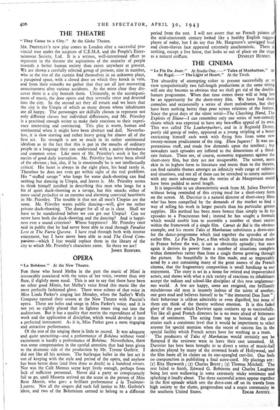" They Came to a City." At the Globe Theatre.
THE THEATRE
Ma. PRIESTLEY'S new play comes to London after a successful pro- vincial tour under the auspices of C.E.M.A. and the People's Enter- tainment Society, Ltd. It is a serious, well-intentioned effort to represent in the theatre the aspirations of the majority of people towards a better human society than exists anywhere at present. We are shown a carefully selected group of persons, nine in number, who at the rise of the curtain find themselves in an unknown place, a parapeted space, with a closed door on which they knock in vain, and from their remarks we gather that they are all just recovering consciousness after various accidents. As the mists clear they dis- cover there is a city beneath them. Ultimately, to the accompani- ment of music, the door opens and they severally enter and descend into the city. In the second act they all return and we learn that the city is the Utopia of which so many dream whose inhabitants are all happy. The personages are skilfully chosen to represent not only different classes but individual differences, and Mr. Priestley is a practised enough writer to make their reactions to their experi- ence interesting and convincing. This play is warm, human and sentimental when it might have been abstract and dull. Neverthe- less, it is slow starting and rather heavy going for almost all of the first act. Its strength is not so much in its rather sentimental idealism as in the fact that this is put in the mouths of ordinary people in a language they can understand with a native shrewdness and common sense. Like most of Mr. Priestley's work it has the merits of good daily journalism. Mr. Priestley has never been afraid of the obvious ; but, alas, if he is emotionally he is not intellectually critical. His heart is always in the right place, his head rarely is. Therefore he does not even get within sight of the real problems. His " stuffed savage " who longs for some duck-shooting can find nothing but dancing in Utopia, and leaves it. Mr. Priestley seems to think himself justified in describing this man who longs for a bit of quiet duck-shooting as a savage, but this smacks either of mere social prejudice or an extreme and alarming convivial heartiness in Mr. Priestley. The trouble is that not all men's Utopias are the same. Mr. Priestley wants public dancing—well, give me rather private duck-shooting. The danger for all of us is clear. Shall we have to he standardised before we can get our Utopia? Can we never have both the duck-shooting and the dancing? And is happi- ness ever a sound criterion? Whose happiness? Mr. Priestley once said in public that he had never been able to read through Paradise Lost or The Faerie Queene. I have read through both with intense enjoyment, but I have never been able to read The Good Com- panions—which I fear would replace them in the library of the city to which Mr. Priestley's characters came. So there we are!
JAMES REDFERN.






















 Previous page
Previous page